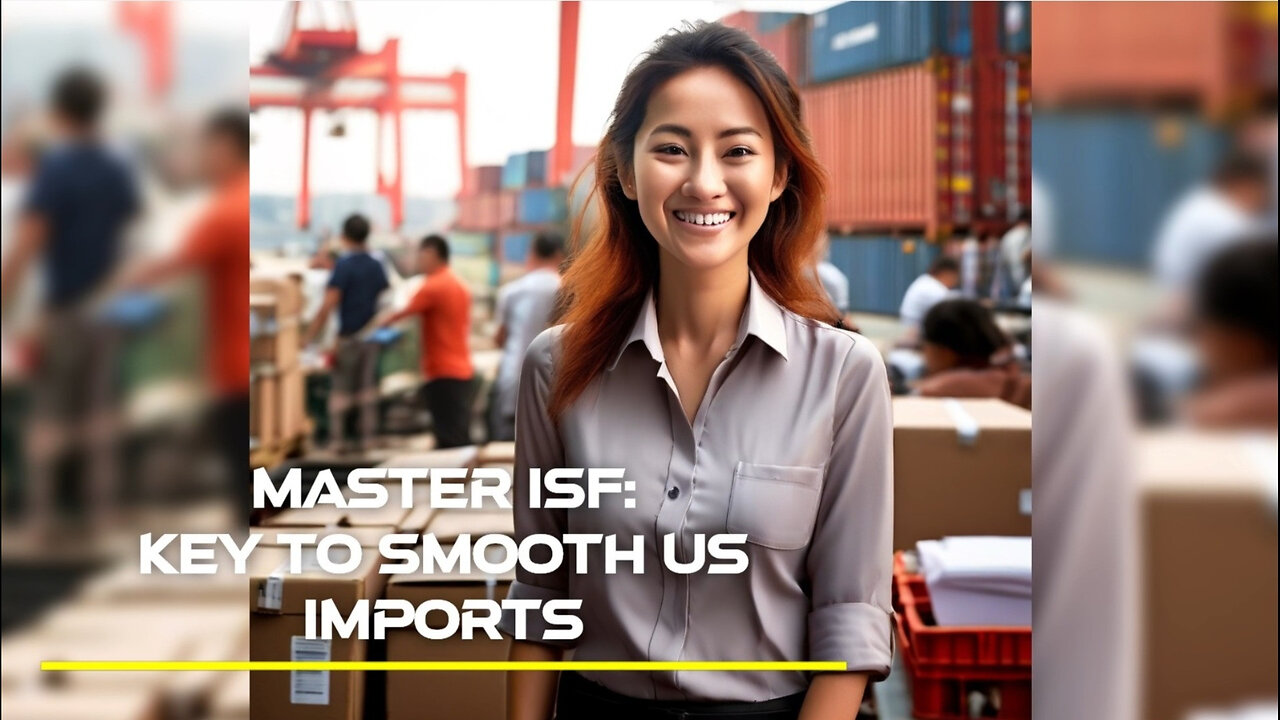Premium Only Content

Unlocking the Secrets of Importer Security Filing: Everything You Need to Know!
ISF Template | 562-453-7357 | isf@isftemplate.com | www.isftemplate.com
Import Security Filing (ISF) is a requirement imposed by the US Customs and Border Protection (CBP) agency that mandates importers or their authorized agents to provide specific information about imported goods before they are loaded onto a vessel bound for the United States. This filing must be done at least 24 hours prior to the cargo being loaded. The primary objective of ISF is to enhance the security of the international supply chain by allowing CBP to identify potential security risks associated with imported goods. ISF also helps ensure the accuracy of import data, facilitate the efficient flow of cargo, and minimize the risk of cargo holds or customs penalties.
The information required in an ISF filing includes details about the importer, such as their name, address, and contact information. It also includes information about the manufacturer or supplier, the country of origin, and the HTS codes of the goods being imported. Other important details include the consolidator or the party responsible for loading the goods, the container or vessel information, and a description of the cargo.
It's important to note that an ISF is not the same as a customs entry or a customs bond. An ISF is a separate filing required in addition to a customs entry. A customs bond is a financial guarantee that ensures compliance with customs regulations and payment of any duties or fees associated with the import. A customs broker can assist importers in both the ISF filing and obtaining a customs bond if required.
Importers can submit the ISF through a licensed customs broker, using the CBP's Automated Broker Interface (ABI), or through the Automated Manifest System (AMS). Electronic filing has become the preferred method in recent years due to its faster and more accurate processing.
Non-compliance with ISF requirements can result in penalties, cargo holds, and delays in cargo release. Importers should understand their obligations and work closely with their customs brokers to ensure compliance. Once the ISF is successfully filed, importers receive an ISF acknowledgment receipt, which serves as proof of compliance and should be maintained for record-keeping purposes. Any changes to the ISF information must be promptly reported to the CBP to avoid penalties or delays.
Compliance with ISF regulations is crucial for smooth and efficient international trade operations. By understanding the importance of ISF and working closely with customs brokers, importers can navigate the customs clearance process effectively and ensure compliance with regulatory requirements.
#ISFexplained #customsbrokerage #internationaltradeinsights #importsecurityfiling #complianceiskey #customsclearance #USCBP #supplychainsecurity #importoperations #customsregulations
Video Disclaimer Here: This video is designed for education and is unaffiliated with US government bodies.
"00:30 - Importer Security Filing (ISF) is a requirement by the U.S. Customs and Border Protection for importers to provide information about imported goods before they are loaded onto a vessel bound for the United States, at least 24 hours prior to loading.
00:57 - ISF enhances security in the international supply chain by identifying potential risks with imported goods, ensuring data accuracy, facilitating cargo flow, and reducing the risk of penalties or delays.
01:27 - Information required in an ISF filing includes importer details, manufacturer/supplier information, country of origin, HTS codes, consolidator details, vessel information, and cargo description. ISF is separate from customs entry and bond.
02:30 - Importers can submit ISF through a licensed customs broker, CBP's Automated Broker Interface, or the Automated Manifest System. Non-compliance can lead to penalties, cargo holds, and delays, making it crucial for importers to understand and meet ISF requirements for smooth international trade operations.
"
-

WeAreChange
3 hours agoBIDEN 180: Crime Family Coverup Exposed By Joe’s Pardon Of Hunter!
37.5K16 -
 47:03
47:03
Kimberly Guilfoyle
5 hours agoThe FBI is now Kash Only, Live with Larry Elder & Steve Friend | Ep. 178
63.2K10 -
 1:02:30
1:02:30
Sarah Westall
3 hours agoWhy Realistically Gold Could Increase to $100,000+ to Pay Off the National Debt w/ Andy Schectman
2.75K3 -
 54:43
54:43
LFA TV
1 day agoThe Biden Crime Family Is Above the Law | Trumpet Daily 12.2.24 7PM EST
31.3K2 -
 LIVE
LIVE
Tundra Gaming Live
5 hours agoThe Worlds Okayest War Thunder Stream
51 watching -
 LIVE
LIVE
BIG NEM
18 hours agoNeema Naz's Rise to FAME from Comedy Skits to SOLD OUT Arenas!
35 watching -
 LIVE
LIVE
2 MIKES LIVE
3 hours ago2 MIKES LIVE #150 Capt. Christopher Kuehne released from Prison! News, Pardons, Games and Kash!
118 watching -
 1:54:22
1:54:22
Redacted News
5 hours ago"BREAKING! Trump Declares WAR on Deep State Biden Corruption, Hunter Biden Pardon Exposed "
123K179 -
 51:33
51:33
Candace Show Podcast
6 hours agoHunter Biden Didn’t Do ‘Nuffin | Candace Ep 112
115K195 -
 1:01:54
1:01:54
LFA TV
1 day agoJOE PARDONS HUNTER TO SAVE HIMSELF?! | UNGOVERNED 12.2.24 5pm EST
37.4K8